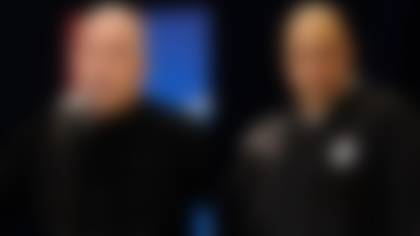With the 2021 NFL Draft just around the corner, teams are wrapping up their prospect evaluations and running through scenarios that could play out once picks start being made on April 29.
Now, even with best-laid plans, sometimes the board just doesn't fall a team's way. But what if it did? NFL.com draft analyst Chad Reuter operates in that scenario as he identifies the ideal top two picks for every club.
Some players could be ideal picks for several teams, but each prospect was only listed once to give a more realistic view on where they may be available. You will notice some top talents, including Clemson RB Travis Etienne, TCU S Trevon Moehrig and Georgia edge rusher Azeez Ojulari, are not included in this article. Their absence is a result of the nature of this exercise -- which doesn't include second-round picks for teams that have two first-rounders -- and NOT a statement on my draft projection for those players.
AFC
Round 1: No. 27 overall -- Kadarius Toney, WR, Florida
Round 2: No. 58 overall -- Hunter Long, TE, Boston College
In 2015, Baltimore selected a receiver in the first round (Breshad Perriman) and a tight end in the second (Maxx Williams) -- don't be surprised if it happens again this year. Toney can play in the slot or outside because of his short-area foot quickness and pure speed after the catch. With Mark Andrews due to become a free agent after the season and Nick Boyle coming back from injury, picking up a red-zone and deep-seam threat like Long in the second round would be a great find.
Round 1: No. 30 overall -- Ronnie Perkins, edge, Oklahoma
Round 2: No. 61 overall -- Elijah Molden, CB, Washington
The Bills are a prime candidate for trading out of the first round because their roster is so solid that they can afford to take a few steps back and still get a player of value. Perkins is a strong 4-3 rush end in the mold of Bills veteran Jerry Hughes, whose contract happens to expire after the 2021 season. By picking Perkins, general manager Brandon Beane gets depth on the line this year and a future starter. Molden is another value pick. He's not the biggest or fastest player, but the son of former NFL defensive back Alex Molden is a playmaker with the instincts and toughness to play in the slot or deep half.
Round 1: No. 5 overall -- Penei Sewell, OT, Oregon
Round 2: No. 38 overall -- Javonte Williams, RB, North Carolina
Joe Burrow's season-ending injury occurred in the pocket when he was hit by one defender coming in high and another low. The team must improve its offensive line so that doesn't happen again. Sewell can dominate at left tackle, former first-round pick Jonah Williams can play right tackle (where he started for two years at Alabama) and veteran acquisition Riley Reiff has experience at guard. Starting running back Joe Mixon also fought injuries in 2020, and the team recently released veteran Giovani Bernard. Williams' powerful running style, therefore, will be on the Bengals' radar at No. 38.
Round 1: No. 26 overall -- Zaven Collins, LB, Tulsa
Round 2: No. 59 overall -- Daviyon Nixon, DT, Iowa
The Browns are a stud middle linebacker away from being a championship-level team. Collins can be that guy, attacking gaps and operating adeptly in coverage. The loss of Larry Ogunjobi in free agency also leaves an opening inside, where Nixon will use his length and quickness to cause problems for quarterbacks attempting to step up in the pocket and running backs trying to make progress between the tackles.
Round 1: No. 9 overall -- Justin Fields, QB, Ohio State
Round 2: No. 40 overall -- Jamin Davis, LB, Kentucky
In a conference with Josh Allen, Justin Herbert, Lamar Jackson, Patrick Mahomes and Deshaun Watson (though his status is obviously in flux at the moment), the Broncos need an elite quarterback to contend for the title. Fields has a chance to be just as effective a quarterback as Watson because of his athleticism, arm strength and on-field leadership style. The team could use a right tackle, but the value of a linebacker like Davis is just too strong to ignore. Davis is a first-round talent, but inside linebackers such as Fred Warner have gone later, despite having similar difference-making ability.
Round 3: No. 67 overall -- Rashad Weaver, edge, Pittsburgh
Round 4: No. 109 overall -- Derrick Barnes, LB, Purdue
The Texans don't have a first- or second-round pick -- those selections were sent to the Dolphins in the trade for tackle Laremy Tunsil and receiver Kenny Stills in 2019. Therefore, they'll need to rely on their middle-round picks to continue re-tooling the defense in coordinator Lovie Smith's scheme. They brought in Shaq Lawson and some back-end depth via free agency, but they still need more front-seven help. Weaver proved his pass-rush acumen as a senior. Barnes is a do-it-all linebacker who could play inside or outside for Houston.
Round 1: No. 21 overall -- Samuel Cosmi, OT, Texas
Round 2: No. 54 overall -- Kelvin Joseph, CB, Kentucky
The retirement of left tackle Anthony Castonzo leaves a gaping hole for the Colts to fill. Cosmi's a carbon copy of Castonzo and would immediately step into that starting role. Look for the team to trade down a few spots in the first round and still grab the former Longhorn. Joseph sat out the 2019 season after transferring from LSU to Kentucky, per NCAA rules, but he showed why he was once a top-50 recruit in 2020. He could be a steal at No. 54 for GM Chris Ballard.
Round 1: No. 1 overall -- Trevor Lawrence, QB, Clemson
Round 1: No. 25 overall -- Alex Leatherwood, OT, Alabama
The Jaguars' selection here has long been set. Head coach Urban Meyer knew he would be able to draft Lawrence when signing on for the job. The team's second pick in the first round (acquired from the Rams in the Jalen Ramsey trade) would be wisely spent on enhancing the protection for Lawrence. Leatherwood is a steady, underappreciated pass protector and moves well in space in the run game. He could compete with franchise-tagged Cam Robinson for time at left tackle in 2021, and probably take over at that spot in the future.
Round 1: No. 31 overall -- Alijah Vera-Tucker, OL, USC
Round 2: No. 63 overall -- Quinn Meinerz, OL, Wisconsin-Whitewater
Kansas City released both of its starting tackles this offseason before signing guard Joe Thuney and bringing in former Bears guard Kyle Long after he spent a year out of the game. Both tackle spots are still up for grabs, though, so finding an intelligent, sturdy starter in Vera-Tucker (who also has experience at guard) would be great. The Chiefs signed former Rams starter Austin Blythe to a modest one-year deal, so I'm guessing that won't prevent them from drafting another pivot. Meinerz was a guard at Division-III Wisconsin-Whitewater but has been working on his snapping to earn a job at center. The versatility offered by Vera-Tucker and Meinerz will come in handy if injuries beset the line again next fall.
Round 1: No. 17 overall -- Teven Jenkins, OT, Oklahoma State
Round 2: No. 48 overall -- Jevon Holland, S, Oregon
GM Mike Mayock and head coach Jon Gruden traded offensive tackle Trent Brown to the Patriots in March, leaving a big hole on the line. Jenkins would fit in quite well, as his nasty attitude and strength are just what offensive line coach Tom Cable appreciates. Teaming a nickel safety like Holland with the hard-hitting Johnathan Abram and veteran presence Jeff Heath should pay dividends next season.
Round 1: No. 13 overall -- DeVonta Smith, WR, Alabama
Round 2: No. 47 overall -- Dillon Radunz, OL, North Dakota State
The Chargers are often projected to select a left tackle with their top pick, but I think an elite receiver would be too hard to pass up at No. 13. Smith working in the slot with Keenan Allen and Mike Williams outside would be heaven for second-year starter Justin Herbert. Smith could then move outside in 2022 if Williams leaves as a free agent. Of course, they will need to address the offensive line early in the draft. Selecting Radunz to compete with Trey Pipkins at left tackle meets that need, and he showed at the Reese's Senior Bowl that he could play inside, if circumstances require it.
Round 1: No. 6 overall -- Ja'Marr Chase, WR, LSU
Round 1: No. 18 overall -- Jaelan Phillips, edge, Miami
Combining Chase with DeVante Parker and Will Fuller gives second-year quarterback Tua Tagovailoa a shot at making a big jump. Their second pick of the round should go for an edge rusher to replace Shaq Lawson, who was traded to Houston. Phillips is the top prospect at the position because of his length, strength and athleticism, but durability concerns could make him available in the mid-first.
Round 1: No. 15 overall -- Jaylen Waddle, WR, Alabama
Round 2: No. 46 overall -- Tyson Campbell, CB, Georgia
The Patriots have tried to improve their receiver group by signing Nelson Agholor and Kendrick Bourne as free agents. Waddle's speed would take the crew to another level, though. His return ability would be a boon to the Patriots' special teams, as well. Picking up a cornerback like Campbell in Round 2 would build depth for 2021 and provide a potential replacement for Stephon Gilmore, who is in the final year of his contract.
Round 1: No. 2 overall -- Zach Wilson, QB, BYU
Round 1: No. 23 overall -- Najee Harris, RB, Alabama
The decision to trade Sam Darnold to the Panthers confirmed that the Jets intend to start fresh at quarterback with the No. 2 overall selection, and the expectation is Wilson will be the pick. His mobility, accuracy and confidence made it an easier decision for GM Joe Douglas and head coach Robert Saleh, neither of whom was with the team when Darnold was picked third overall in 2018. Frank Gore was 37 years old when he led the Jets in rushing by a wide margin last season. Harris provides the club with a young RB1, and he also gives Wilson a reliable receiver out of the backfield.
Round 1: No. 24 overall -- Creed Humphrey, C, Oklahoma
Round 2: No. 55 overall -- Joseph Ossai, edge, Texas
The retirement of Maurkice Pouncey leaves a hole in the Steelers' offense. Humphrey is an athletic lineman with a wrestling background, which means he brings the toughness the team wants up front. Ossai joins 2020 third-round pick Alex Highsmith as young pass-rush talent to complement All-Pro T.J. Watt. His intelligence, quickness and high motor make him a great fit for the Steelers.
Round 1: No. 22 overall -- Rashod Bateman, WR, Minnesota
Round 2: No. 53 overall -- Alim McNeill, DT, N.C. State
Bateman starred on the outside for the Gophers, but I see him replacing Adam Humphries in the slot for the Titans in 2021. Ryan Tannehill relied on Corey Davis (signed with the Jets this offseason) for some big plays in 2020, so he'll appreciate Bateman's versatility and ability to make plays after the catch. There's also a hole on the defensive line left by DaQuan Jones, who hasn't been re-signed. McNeill's quickness and strength at nose tackle are underappreciated but will be a benefit to whomever drafts him.
NFC
Round 1: No. 16 overall -- Greg Newsome II, CB, Northwestern
Round 2: No. 49 overall -- Elijah Moore, WR, Mississippi
Arizona might have interest in Caleb Farley from Virginia Tech, but if his back procedure gives them pause, then Newsome becomes the pick. He can play outside or in the slot, and has the ball skills to make quarterbacks pay for poor decisions. Picking up an explosive playmaker like Moore in the second round brings much-needed competition to the No. 3 receiver position.
Round 1: No. 4 overall -- Kyle Pitts, TE, Florida
Round 2: No. 35 overall -- Jayson Oweh, edge, Penn State
The team faces a difficult choice at No. 4. The options could include picking Trey Lance or Justin Fields to eventually succeed Matt Ryan, or giving Ryan a great weapon to complement Julio Jones, Calvin Ridley and Hayden Hurst. It would certainly be understandable if they elected to take a QB. But using 12 personnel with Hurst and Pitts would be a major problem for opposing defenses -- and could extend Ryan's career. Jones' injury last year showed that teams can't have too many pass catchers on hand. There's also never enough pass rushers on a depth chart. They should address that position with the third pick in the second round -- or, possibly, trade into the late first round -- to get a defensive end with great potential like Oweh.
Round 1: No. 8 overall -- Rashawn Slater, OL, Northwestern
Round 2: No. 39 overall -- Pat Freiermuth, TE, Penn State
Now that the team has secured its quarterback of at least the near future, it's time to ensure the O-line is up to the task. Slater could step into the left tackle spot, but he also has versatility to play right tackle (as he did for two years at Northwestern) or pop inside. Signing Dan Arnold as a No. 2 tight end made sense, but Freiermuth presents a nice combination of athleticism and toughness after the catch that could lead to Pro Bowl nods in the future.
Round 1: No. 20 overall -- Trey Lance, QB, North Dakota State
Round 2: No. 52 overall -- Richie Grant, S, UCF
There's very little chance that Lance lasts until the 20th pick, but it wouldn't surprise me if the Bears move up to get him (or Justin Fields, or Mac Jones, whoever is still around) if available past the top nine spots. It would be ideal for Lance to play behind Andy Dalton in 2021, and then ascend to the starter spot the following year. Safety is a position of major need for Chicago, so picking up a talent like Grant at No. 52 is a huge bonus. He and Eddie Jackson would form an excellent duo in the back end.
Round 1: No. 10 overall -- Patrick Surtain II, CB, Alabama
Round 2: No. 44 overall -- Jalen Mayfield, OT, Michigan
Seeing a technically sound, tough-minded press corner like Surtain around at No. 10 overall will make owner Jerry Jones and head coach Mike McCarthy very happy. The Cowboys signed veteran Ty Nsekhe to bolster the offensive line depth, but after witnessing the effect of multiple injuries up front in 2020, a value pick like Mayfield (who could line up at right tackle or guard) in Round 2 would make plenty of sense. Guard Connor Williams was a similar pick in 2018 and is scheduled to become a free agent after the season.
Round 1: No. 7 overall -- Micah Parsons, LB, Penn State
Round 2: No. 41 overall -- Asante Samuel Jr., CB, Florida State
There will be some enticing options for the Lions at No. 7, with a young quarterback, a dynamic receiver and Parsons potentially available. If new head coach Dan Campbell and GM Brad Holmes truly believe in Jared Goff and want to bring speed and toughness to the team's defense, then the former Penn State linebacker is the ideal selection. He has the athleticism to play inside or outside. Samuel could end up being a first-round pick, but there's still a chance his average size (5-foot-10, 180 pounds) makes him a second-rounder. Regardless of where he's selected, the son of the former NFL Pro Bowl corner will be an effective slot defender, if not hassling outside receivers.
Round 1: No. 29 overall -- Caleb Farley, CB, Virginia Tech
Round 2: No. 62 overall -- Brady Christensen, OT, BYU
There's a good chance Farley won't be available to the Packers if they stay put at No. 29. However, they've moved up for a defensive back in two of the past three drafts -- in 2018 for cornerback Jaire Alexander and in 2019 for safety Darnell Savage. Plus, they traded up for quarterback Jordan Love last year, so it would not be shocking to see them move up again. Farley's back issues could make him available in the early 20s, the area in which the Packers would move to pick up the long, quick-footed cover corner. They've knitted together players at the right offensive tackle position since Bryan Bulaga suffered injuries late in his tenure with the team, so investing a premium pick there seems like a good idea. Christensen reminds me of former Packer tackle Chad Clifton, a second-rounder in his own right.
Round 2: No. 57 overall -- Aaron Robinson, CB, UCF
Round 3: No. 88 overall -- Milton Williams, DT, Louisiana Tech
Losing Troy Hill in free agency makes finding a slot cornerback a top priority for the Rams, who traded their first-round pick to the Jaguars as part of the package to acquire Jalen Ramsey. There is enough corner talent in this draft to find a solid value like Robinson with the 57th overall selection. Robinson was an Alabama recruit who transferred to UCF, showing a nice combination of size and agility working inside. The trade of defensive lineman Michael Brockers to the Lions opens up a five-technique spot. It would be a nice landing spot for Williams, who displayed supreme athleticism in games for the Bulldogs and at his pro day.
Round 1: No. 14 overall -- Christian Darrisaw, OT, Virginia Tech
Round 3: No. 78 overall -- Kyle Trask, QB, Florida
Picking up the third-best left tackle in the draft at No. 14 would be ideal following the departure of veteran Riley Reiff. Quarterback Kirk Cousins will value Darrisaw's strength in pass protection, and his agility and power in the run game will be appreciated by stud back Dalvin Cook. Trask reminds me of Nick Foles, projecting as a solid backup for Cousins in the short term and potentially working his way into a starting role in time.
Round 1: No. 28 overall -- Eric Stokes, CB, Georgia
Round 2: No. 60 overall -- Davis Mills, QB, Stanford
Marshon Lattimore, Patrick Robinson and P.J. Williams are due to become free agents after the 2021 season, so picking up an athletic corner with ball skills like Stokes gives head coach Sean Payton and GM Mickey Loomis a player who can contribute immediately and grow into a bigger role. If Payton and Loomis can't move up for one of the top quarterbacks in the first round, they will likely consider Mills' potential as an efficient pocket passer. Even if Jameis Winston plays well in 2021, having Mills as a third quarterback could be valuable in case of injury.
Round 1: No. 11 overall -- Kwity Paye, edge, Michigan
Round 2: No. 42 overall -- Levi Onwuzurike, DT, Washington
GM Dave Gettleman could continue to improve the team's offense, as he did by signing receiver Kenny Golladay last month. But Paye's power and agility on the edge would really bolster the team's pass rush. He dropped down to 261 pounds at his pro day, showing he can play as a stand-up defender. Gettleman could be thinking receiver in Round 2, but he might not be able to pass up a defensive tackle that plays very much like Dalvin Tomlinson, who departed in free agency. Onwuzurike is only 290 pounds right now, but he could get bigger and still maintain his quickness off the ball.
Round 1: No. 12 overall -- Jaycee Horn, CB, South Carolina
Round 2: No. 37 overall -- Terrace Marshall Jr., WR, LSU
I expect the Eagles to select at least two cornerbacks in this draft, and they should have a chance to pick one of the top two in the class after trading down six spots to No. 12 overall. Horn is a physical defender with good ball skills, which isn't surprising since he's the son of former NFL receiver Joe Horn. Marshall is a potential first-rounder, as well, but Philadelphia would love to add him as a reliable playmaker on the outside, giving second-year quarterback Jalen Hurts more help.
Round 1: No. 3 overall -- Mac Jones, QB, Alabama
Round 2: No. 43 overall -- Boogie Basham, edge, Wake Forest
During his time in Washington and San Francisco, head coach Kyle Shanahan has had success with quarterbacks like Kirk Cousins and Jimmy Garoppolo, so the 49ers' interest in Jones makes all kinds of sense. He's a smart, accurate passer who will work hard to efficiently operate the Niners' offense. On defense, San Francisco could move Arik Armstead inside full-time, then play Basham at the power end position to maximize both their talents.
Round 2: No. 56 overall -- Ifeatu Melifonwu, CB, Syracuse
Round 4: No. 129 overall -- Austin Watkins Jr., WR, UAB
Seattle does not have first- or third-round picks in this draft because both selections went to the Jets in exchange for safety Jamal Adams. The Seahawks are lacking depth at cornerback with the departure of Shaquill Griffin; Melifonwu is exactly the sort of long, physical corner Pete Carroll has coveted for his defense. In the fourth round, the team will review a handful of available receivers to work with DK Metcalf and Tyler Lockett. If they want Lockett to stay in the slot more often, then Watkins makes sense as an eventual starter on the outside.
Round 1: No. 32 overall -- Gregory Rousseau, edge, Miami
Round 2: No. 64 overall -- Christian Barmore, DT, Alabama
Tampa Bay re-signed Shaquil Barrett, but Jason Pierre-Paul is due to become a free agent after the season. Pass rusher depth is crucial to keeping the defense disruptive in the future. Strength in the interior D-line is also a worthwhile investment, especially with veteran linemen Ndamukong Suh and William Gholston scheduled for free agency in 2022. Barmore's talent will flourish as part of a strong Buccaneers rotation, although there's a good chance he'll be picked before No. 64.
UPDATE: The Bucs' second-round pick was changed from North Carolina's Michael Carter to Barmore following Tampa Bay's signing of Giovani Bernard.
Round 1: No. 19 overall -- Jeremiah Owusu-Koramoah, LB, Notre Dame
Round 2: No. 51 overall -- Liam Eichenberg, OT, Notre Dame
Head coach Ron Rivera has an outstanding defensive line and now will work on building up the other two levels. JOK would fit in well in Rivera's scheme to handle coverage responsibilities versus tight ends and slot receivers. He also wrecks outside runs when lanes open up to him. Eichenberg played left tackle at Notre Dame, a position Washington has been trying to sort out since Trent Williams last played for the team in 2018.
Follow Chad Reuter on Twitter.












































